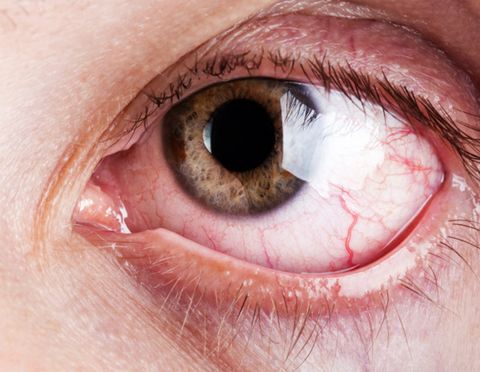How To Make A Picture Blurry In Photoshop

Eyes going bad? Upping your glasses prescription might not be the fix. Blurry vision—things looking hazy, murky, oily, or out of focus—doesn't always signal a change in your refractive error.
"Causes of blurred vision could be milder things, or they could be really harmful things that can cause permanent vision loss," says Rebecca Taylor, M.D., an ophthalmologist and clinical spokesperson for the American Academy of Ophthalmology. "Blurred vision is not normal. If you have it, get it checked out."
Squint your way through some of the most common causes on this list. And if any sound familiar, call your eye doc to set up an appointment.
Related Video:
1. Your Peepers Are Parched

One of the most common causes of blurry vision is dry eye. Think you've got it? If your vision improves after you blink, you might be on to something, says Dr. Taylor.
Your cornea, the dome-shaped surface in the front of your eye, needs to be well-lubricated in order for you to see clearly. If you don't produce enough tears, or your tears aren't high quality, the cells on top of your cornea flake away. And when your cornea dries out, it's like looking through a windowpane that's been rubbed with oil, says Dr. Taylor.
Dry eye can be caused by some medicines, and even some habits. Reading, playing video games, watching TV, or working on the computer can all be culprits, since they can cut your blink rate. So follow the "20-20-20 rule" to help relax your eyes: Every 20 minutes you're doing those activities, focus on something 20 feet away from you for 20 seconds.
If your eyes still feel gritty and tired, consider using some artificial tears to refresh them. But make sure you bring up your dry eye to your doc, because it can also be a symptom of other medical conditions like rheumatoid arthritis, lupus, and thyroid disease, says Dr. Taylor.
2. You Slept Weird Last Night

Here's how sleeping can lead to squinting: If your face is smushed against the pillow during shuteye, you might wake up with a serious case of dry eye in the morning. That's because moving during the night causes your eyelids to snag on your pillow, which pulls them away from the eyeballs. Sahara-like dryness ensues. This is a sign of something called floppy eyelid syndrome, which is more common in heavier guys.
"They can constantly have blurred vision, discomfort, and irritation," says Dr. Taylor.
Blowing air can also dry out your eyes, so nix the bedroom fan. And sleeping with pressure on your eyes—say, with your hand or your arm covering them—is a no-no, because it can cause compression of the tissue and limit circulation in your orbs, leading to blurriness when you wake up, says Dr. Taylor.
3. You Popped Some Pills

Lots of different meds can cause blurry vision, including pills for high blood pressure, oral steroids, sleeping aids, and erectile dysfunction drugs.
Pay extra close attention to antihistamines, which include OTC allergy meds Zyrtec and Claritin. They may trigger a chemical reaction in your body that reduces your tear production, says Dr. Taylor.
Even worse, antihistamines may also increase your risk of narrow-angle glaucoma, especially if you're farsighted or of Asian or American Indian descent. "Their eyes are sort of set up for that kind of glaucoma, and antihistamines can tip them over," says Dr. Taylor.
If you're taking any medication and notice your vision becomes blurred and painful, call your ophthalmologist.
4. Your Contacts Are Disgusting

A 2011 study in Optometry and Vision Science found that 85 percent of contact lens wearers considered themselves competent in lens care practices. But researchers found only 2 percent actually showed good compliance. Womp womp.
The scientists docked participants for sleeping in their lenses. The reason: A lens that's been in the eye too long can get gunky with extra amounts of protein, which can blur your vision.
"It would be like if you smeared little blobs of gel over your window," says Dr. Taylor. "That's why vision goes down."
What's more, wearing lenses too long or cleaning them incorrectly—another problem shared by many people in the study—can increase the buildup of bacteria or even parasites on the lenses. And that, of course, increases your risk of a serious eye infection.
So practice good lens care: take your lenses out every day, clean them correctly, change your solution, and replace your case every month. And if you notice blurry vision with redness or pain, tell your eye doctor.
5. Your Blood Sugar is Sky High

Blurred vision may actually signal something wrong throughout your entire body, not just with your eyes. In some cases, it can even be one of the earliest warning signs of diabetes.
When your blood sugar gets too high, it can cause the fluids to shift in your eye and your lenses to change in size. And when the size changes, your eyes focus differently, Dr. Taylor says.
The good news is? Once you get your blood sugar back in check, your vision usually returns back to normal. And it's likely to stay that way if you keep your diabetes under control. But let your blood sugar continue to spike, and you may set yourself up for damage to your retinas and even vision loss down the road.
The bottom line: If you notice a significant change in your vision—lots of blurriness and a reduced ability to focus either up close or far away—schedule an appointment. Your eye doc may test you for diabetes as well as recommend an eye exam.
6. Your Eyes May Be Clouded By Cataracts

While the risk of cataracts increases as you age, you can actually develop them at any age—or you can even be born with them, says Dr. Taylor.
Cataracts are cloudy or opaque areas in your eye lenses that can cause blurry vision (especially at night), trouble reading, or color distortion. They're more common in people with diabetes, those who take medications like corticosteroids, and those who smoke.
Get on the offensive and prevent cataracts before they overtake your orbs. You can start by never missing a sweat session: New research from the Lawrence Berkeley National Laboratory found that running can decrease your risk of cataracts—and the effect is more pronounced the more vigorous you go.
7. You Might Be Having a Stroke

Vision symptoms are common in full-blown strokes and transient ischemic attacks (TIA), also known as mini-strokes. The difference between the two: A mini-stroke is a temporary blockage of blood flow, like if you crimp a flowing garden hose for a few seconds and then release it. A stroke, meanwhile, would be like tying off the hose completely. Mini-strokes function as a warning sign that a full-blown stroke might be imminent.
TIA symptoms can come on very quickly, and they might not last too long. They include blurred vision, twinkling lights, or seeing a "curtain" pull down from the top to the middle of your field of vision, says Dr. Taylor.
You might also experience grayed or darkened vision for a few seconds to a few minutes. Other symptoms include change in hearing or taste, confusion, coordination problems, or trouble speaking.
A stroke is a medical emergency, so if you think you're having one, you need to seek medical care right away—treatment is most effective within a few hours of the onset.
Christa Sgobba For nearly 10 years, Christa has created health, fitness, nutrition, and wellness content that's steeped in science but engaging enough that people actually want to read it.
This content is created and maintained by a third party, and imported onto this page to help users provide their email addresses. You may be able to find more information about this and similar content at piano.io
How To Make A Picture Blurry In Photoshop
Source: https://www.menshealth.com/health/a19544030/7-reasons-eyes-are-blurry/
Posted by: zurcherpudge1936.blogspot.com

0 Response to "How To Make A Picture Blurry In Photoshop"
Post a Comment